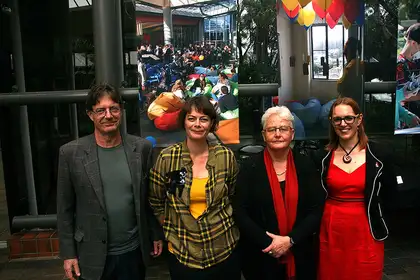
Leaders of the Wellington campus Pukeahu ki Tua Think Differently project, from left, Professor Frank Sligo, Student Services Associate Director Amy Heise, Associate Professor Robin Peace and project manager Andrea Marsden at celebrations to mark the hand over of the project.
The three-year Living Lab innovation project, Pukeahu ki Tua on the Wellington campus, may have closed but the mauri (life force) of the project has been passed back to the campus to ensure the work continues.
Pukeahu ki Tua Whanganui-a-Tara | Think Differently was established in 2015 and co-created by staff and students on the Massey Wellington campus to increase communication and stakeholder engagement, and support projects aimed at improving student employability and entrepreneurship. It has involved more than 50 departments, schools, colleges and clubs across the University, including nearly 900 Massey students and more than 200 high school students.
Co-directors Associate Professor Robin Peace from the School of People, Environment and Planning, Professor Frank Sligo from the School of Communication, Journalism and Marketing, and Amy Heise, Associate Director Student Services, with project manager Andrea Marsden, hosted a celebration in the aptly chosen Pyramid space, to mark the opportunity for new nets to go fishing: ka pū te ruha, ka hao te rangatahi.
Speaking at the event, Robin recalled the inspiration for this project, and its predecessor, the Pukeahu Campus Identity project, as drawing from the place of the campus on Pukeahu, the hill once set aside for local iwi as one of the ‘Tenths’, repossessed by the Crown and then vested as an educational precinct, and acknowledged the ongoing support of Te Atiawa, Taranaki Whanui and the Tenths’ Trusts.
Other speakers noted examples such as Project Pyramid and campus way-finding initiatives that used student project management and design interns to develop enhanced physical campus spaces, such as the transformed Pyramid, where actions such as the installation of a coffee cart, soft furnishings and better heating and air conditioning had contributed to a revitalised environment. This space has been widely used by other Pukeahu projects such as the Create1World activism conference and the display of collaborative artwork from the Selekā Club artist residency.
Other activities that encouraged collaboration and innovation included the development of the Pukeahu pathway to encourage the campus community to make use of the green spaces on campus and discover the sculptures and history of the land the campus sits on. Much of this development was inspired via the project incubator Campus Co-lab that helped make staff and students’ ideas to improve campus life a reality.
Many proposals, financed on average with $3825 from a Contestable Fund, identified well-planned and deliverable projects that were undertaken by team members across the colleges made up of students, academic staff, professional staff and stakeholders.
Next week one of its last projects, called Love Your Campus, Love Your City, will be launched by School of Design senior lecturer Euan Robertson to help students spruce up the campus.
In September, an exhibition of student work from a zine-making workshop being held as part of the Asian Aotearoa Arts hui, will be shown in the campus library.